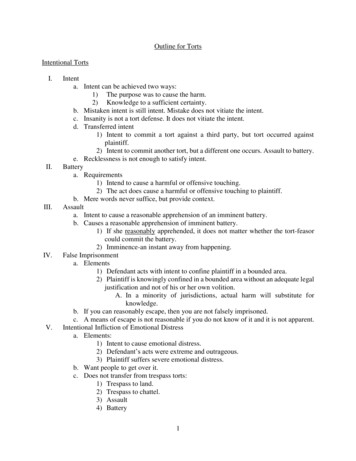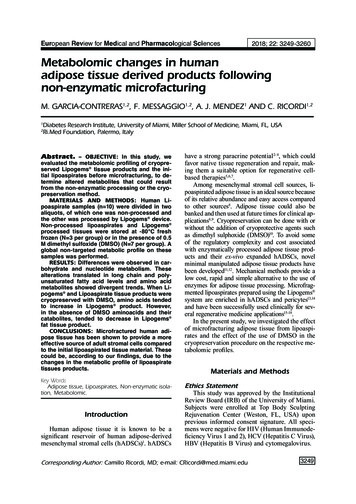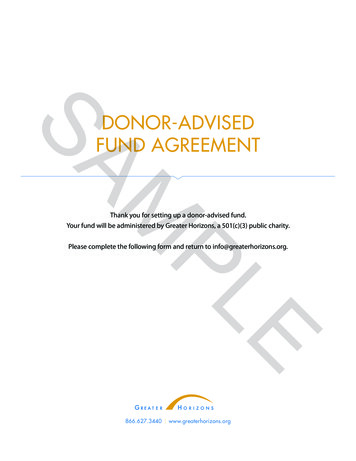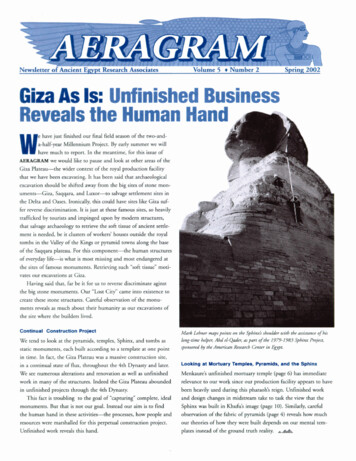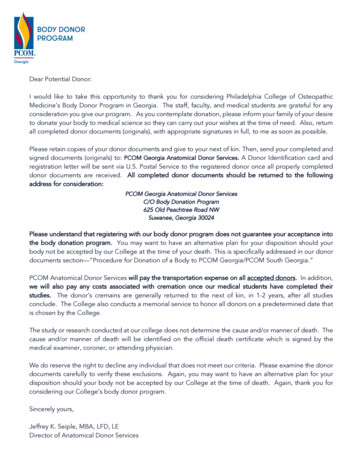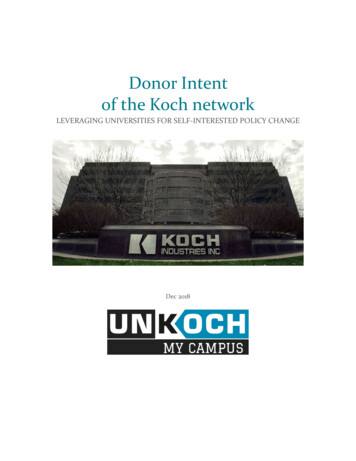
Transcription
Donor Intentof the Koch networkLEVERAGING UNIVERSITIES FOR SELF-INTERESTED POLICY CHANGEDec 2018
Table of ContentsCharles Koch and Koch IndustriesTable of ContentsTable of Contents. 1Introduction .2Charles Koch and Koch Industries .3Long Standing Pattern of Corporate Corruption .31. Koch's Philanthropic Strategy and the Role of Academia .5A. “Anti-Capitalism and Business” (Charles Koch, 1974): .5B. “The Business Community: Resisting Regulation” (Charles Koch, 1978) . 6C. “The Structure of Social Change” (Richard Fink, late 1970s) . 9D. “Leveraging Science and Universities,” (Koch Foundation Officials, 2014): . 10E. The Benson Memo (Bruce Benson, 2007) . 12F. Remarks at APEE (Charlie Ruger, 2016) . 132. From “Stealth,” (Clayton Coppin, 2003 Unpublished) . 16A. “Expenditures on Scholarship Aimed At Bringing About Social Change,” (GeorgePearson, 1976) . 16B. “National Socialist Political Strategy: Social Change in a Modern Industrial Societywith an Authoritarian Tradition,” (Leonard Liggio, 1976) . 18C. Lessons Learned from the John Birch Society, (Charles Koch, 1976) . 183. Meaning of Select Phrases Used by the Koch Foundation . 22A. Origins of Koch’s “Well-Being” (Richard Fink and James Otteson, 2014) . 22B. “Republic of Science,” (Michael Polanyi, 1962) . 244. Covert Language and Radical Aims .27A. “Radicals for Capitalism,” (Richard Fink and Peter Boettke, 2007) . 27B. “Seems Neutral, but it isn’t” (James Piereson, 2005-2008) . 27Return to Table of Contents1
IntroductionCharles Koch and Koch IndustriesIntroductionCharles Koch’s political activities consist of a large and rapidly growing network ofwealthy corporate and ideological donors that coordinate funding to achieve policychange by leveraging universities, think tanks, front groups, and politicians.The Koch family has funding efforts to impose corporate-friendly policies and repeal civilrights protections. and Since 2003, this strategy has been coordinated at Charles Koch'shighly secretive bi-annual donor “seminars.” Charles Koch told USA Today that hisSeminar Network intended to spend 899 million around the 2016 electionDespite the notoriously covert nature of their operation, several key documents andrecordings have been obtained that reveal Koch’s intent and the strategy they’ve beenusing for decades. These are primary sources include accounts from Koch network allies,Koch foundation officials, and Charles Koch himself.We have collected what we believe to be the key resources needed to illuminate Koch’sbusiness strategy, and its resulting political and academic strategy.After an introduction to the Koch family’s driving motivation, Koch Industries Inc., theearly writings of Charles Koch from 1970’s reveal the longstanding indignation of abillionaire “resisting regulation,” and his aspirations to build a free-market “cadre” ofscholars through “highly leveraged” campus donations in order to “defeat the statistparadigm.” Additional documents and recordings from Koch foundation officials not onlyreveal the final version of Koch’s “integrated strategy,” but confirm that has been used fordecades and continues as the guiding strategy of Koch’s Seminar Network.In excerpts from an unpublished history of Charles Koch (commissioned by his brother ina family-feud), we see several papers presented at a 1976 conference of the Center forLibertarian Studies sponsored by 65,000 from Charles Koch. In several papers, Kochhimself, his political lieutenant George Pearson, and several free-market “Austrian school”economists laid out strategies for a corporate-funded political revolution, many whichhave been adopted by Koch’s network. Papers described how donors can maintain controlover the use of their campus donations, how the libertarian movement should learn fromthe Nazi Youth program and its success in capturing the state, and what lessons themovement should learn from Koch’s longtime membership in the industry-funded/farright group, the John Birch Society.Additional documents reveal the clear intent by other donors and scholars, aiming tocovertly leverage philanthropy for political and ideological gain.These primary sources show beyond a shadow of a doubt that the Koch network’s campusdonations are for overtly political ends, using covert means, in bad faith.Return to Table of Contents2
IntroductionCharles Koch and Koch IndustriesCHARLES KOCH AND KOCH INDUSTRIESFor two generations, the Koch family has waged a covert political war to preserve theinterests of the nation’s wealthiest corporations and families.Charles Koch is Chair and CEO of Koch Industries, the second largest private corporationin the United States. Originally founded by Koch’s father, Charles and his brother David(the “Koch brothers”) have grown the company exponentially, with revenues at 110 billionas of 2018 (estimated by Forbes).Koch Industries is a highly diversified corporation, with extensive interests in industryincluding (but not limited to) the acquisition, development, refinement, manufacture,transport, and trade - of - crude oil, oil products, tar sands oil, oil pipeline, nitrogenfertilizer, petroleum, petro-chemicals, petro-chemical fibers, carpet, coal, natural gas,concrete, lumber, paper, industrial metals, industrial chemicals, ethanol, cattle ranching,water filtration, and real estate, as well as financial sector interests like commoditytrading, derivatives, hedge funds, risk management. Koch is also a producer of electroniccomponents for phones and voting machines, and produces defense technology likeaircraft radar and communications systems, missile guidance systems and unmannedvehicle monitoring systems, etc.These activities are highly profitable and, because they bring about considerable harms topeople and the environment, they are highly regulated, and such regulations pose a(perceived) threat to the Koch family’s wealth.The family has waged an elaborate political struggle against government oversight fordecades, not just opposing but repeatedly violating regulations designed to protect thepublic.LONG STANDING PATTERN OF CORPORATE CORRUPTIONKoch’s corporate activities frequently violated regulations, and moreover, but they haverepeatedly shown a criminal inclinations.A 1989 U.S. Senate investigation found Koch Oil to be “a widespread and sophisticatedscheme to steal crude oil” from Native American land “through fraudulent mis-measuringand reporting,” ultimately resulting in the theft of at least 31 million dollars worth of oil.The engineers instructed to carry out the corrupt method of over-extraction calledit the “Koch method.”In 1999, Koch was convicted of not just negligence, but malice in the death of two Texasteenagers a faulty gas pipeline explosion.Return to Table of Contents3
IntroductionLong Standing Pattern of Corporate CorruptionIn 2000, the Environmental Protection Agency found that Koch Petroleum systematicallycovered up the dumping of high ammonia wastewater and jet fuel in Minnesota.In 2001, the Department of Justice found that Koch elaborately and purposefully concealedthe illegally dumping of at least 91 tons of benzene into Texas waterways.In late 2016, despite being the largest owner of the Colonial Pipeline, Koch Industries willavoid any liability for the historic gas spill in Shelby County, Alabama, which resulted inhundreds of thousands of gallons of gas spilled, and several deadly explosions - claiming atleast one life. The list could go on. See Greenpeace’s profile on Koch Industries for more.This lack of corporate accountability is a textbook example the “economic freedom” andcorporate “well-being” promoted by the Koch foundation.Koch has facilitated a network of political and corporate donors who have spent hundredsof millions of dollars on universities, think-tanks, and political groups for political agendathat reforms regulations and taxes to profit the wealthy and white-collar criminals.Charles Koch told USA Today that their umbrella group, the Freedom Partners Chamberof Commerce, intended to spend 899 million on the 2016 election.Their political largesse, in true Koch styling, has also proven criminal. Also in 2016, theFederal Election Commission announced record fines for several Koch affiliated “darkmoney groups . . . for concealing the sources of funds spent on political ads in 2010.”Return to Table of Contents4
1. Koch's Philanthropic Strategy and the Role of AcademiaA. “Anti-Capitalism and Business” (Charles Koch, 1974):1. Koch's Philanthropic Strategy and the Role of AcademiaThe objectives of Koch Industries and the Charles Koch Foundation’s academicprogramming can be illuminated clearly by several documents and recordings.In a rare interview, David Koch described the Koch family’s philanthropic strategy:If we’re going to give a lot of money, we’ll make darn sure they spend it in a waythat goes along with our intent. And if they make a wrong turn and start doingthings we don’t agree with, we withdraw funding. We do exert that kind ofcontrol” (Doherty, 2007).While this is an accurate description, the breadth and depth of the strategy is considerablylarger.One of the earliest insights into Charles Koch’s intentions funding higher education canbe seen in a 1974, in the text of a speech given as chairman of the Institute for HumaneStudies to a room of business men.A. “ANTI-CAPITALISM AND BUSINESS” (CHARLES KOCH, 1974):Charles Koch laments:We have supported the very institutions from whichthe attack on the free market emanates. Althoughmuch of our support has been involuntary throughtaxes, we have also contributed voluntarily tocolleges and universities on the erroneousassumption that this assistance benefits business andthe free enterprise system, even though theseinstitutions encourage extreme hostility to Americanbusiness. We should cease financing our owndestruction and follow the counsel of David Packard,former Deputy Secretary of Defense, by supportingonly those programs, departments or schools that“contribute in some way to our individual companiesor to the general welfare of our free enterprise system.”He continues:Return to Table of Contents5
1. Koch's Philanthropic Strategy and the Role of AcademiaB. “The Business Community: Resisting Regulation” (Charles Koch, 1978)We must recognize that a direct political approach contains certain inherentdangers. [.] Thus, political activity is less cost effective than the other approaches,and businessmen should allocate resources accordingly. The important strategicconsideration to keep in mind is that any program adopted should be highlyleveraged so that we reach those whose influence on others produces a multipliereffect. That is why educational programs are superior to political action, andsupport of talented free market scholars is preferable to mass advertizing. Thedevelopment of a well financed cadre of sound proponents of the free enterprisephilosophy is the most critical need facing us at the moment. As the PowellMemorandum points out, “business and the enterprise system are in deep trouble,and the hour is late.” But the system can be restored if business will reexamineitself and undertake radical new efforts to overcome the prevalent anticapitalistmentality. (Charles Koch, 1974, Anticapitalism and Business, pg 67)The “Powell Memorandum” is was a 1971 document from corporate attorney Lewis Powellto the U.S. Chamber of Commerce. It is a blueprint for corporate survival in the face of theCivil Rights, labor, and environmental gains made in the 1960s. Powell, later a SupremeCourt Justice, included clear instructions for the corporate subversion universities andmedia. Koch refers to the document several times, suggesting its analysis, though“laudable,” might be too optimistic.B. “THE BUSINESS COMMUNITY: RESISTING REGULATION” (CHARLES KOCH,1978)One of Charles Koch’s few public essays was published in the Libertarian Review, in anissue entitled “Toward the Second American Revolution: Libertarian Strategies for Today.”Koch proposes a strategy for “businessmen,” composed of three parts, “governmentrelations, education, and political action.”Regarding “government relations,” Koch implores businesses 1 to “advocate the repeal ofexisting regulations in our industries”:Never ask for tighter regulation of a competitor even if he has the advantage ofbeing less regulated than you are. This starts the suicidal cycle which ends in thedestruction of both. Instead we should concentrate on loosening our own1At a 2015 retreat, Charles Koch repeated this line nearly verbatum, that “Business leaders [must] recognizethat their behavior is suicide, that it is suicide long term. To survive, long-term, they have to start opposing,rather than promoting, corporate welfare.” Ironically, since 2000, Koch industries has received at least 231federal, state, or local subsidies, totaling at least 430,830,085, and at least 6,282,000 in federal loans, loanguarantees and bailout assistance (Subsidy Tracker).Return to Table of Contents6
1. Koch's Philanthropic Strategy and the Role of AcademiaB. “The Business Community: Resisting Regulation” (Charles Koch, 1978)regulations. We should defend our own right to be free of unjust regulations, andnot try to shackle competitors. Strategically, the critical point is to fight toeliminate, rather than continue, all interventions, even those that provide shortterm profits. Only by rigidly adhering to this policy can we begin the step-by-stepprocess of freeing ourselves. . .Koch not only recommended mass deregulation, he encouraged industry to resist existingregulations:[W]e should not cave in the moment a regulator sets foot on our doorstep. Putinto practice Henry Manne's recommendation that "the business communityutilize available techniques of legal adversary proceedings to announce publiclyand vigorously, both as individual companies and through associations, that theywill not cooperate with the government beyond the legally compelled minimum indeveloping or complying with any control programs." As he urges, "publicize aswidely as possible the inevitable inefficiencies, mistakes, and human miseries thatwill develop with these controls . help the public understand that morality, in thecase of arrogant, intrusive, totalitarian laws, lies in the barest possible obedienceand in refusal to cooperate willingly beyond the letter of the law." 2Koch elaborates and extends Manne’s call to action:Do not cooperate voluntarily; instead, resist wherever and to whatever extent youlegally can. And do so in the name of justice. . .We have accepted the fallacious concept that the corporation has a broad "socialresponsibility" beyond its duty to its shareholders. We have been made to feelashamed of private ownership and profits, and have been hoodwinked intocharacterizing government regulation as "virtuous" and in the "public interest." Asa typical example, the Advertising Council, backed by most of the major U.S.corporations, goes so far as to describe regulation as, "the promotion of faireconomic competition and the protection of public health and safety." Whatsimple-minded nonsense!Instead of this bankrupt approach, we need to go on the offensive. We need to castaside our desire to be popular with our colleagues and the establishmentintellectuals, to cast aside our fears of reprisals by government. We need toadvertise that the market system is not only the most efficient, it is also the only2Henry Manne eventually served as the longtime dean of George Mason University’s School of Law (19861996), with considerable financial support from Charles Koch.Return to Table of Contents7
1. Koch's Philanthropic Strategy and the Role of AcademiaB. “The Business Community: Resisting Regulation” (Charles Koch, 1978)moral system in history. We need to attack government regulation for wreakinghavoc on those it is allegedly designed to help- those least able to fend forthemselves. We need to stigmatize interventionism as being intrinsically unjustbecause it deprives individuals of their natural right to use their lives and propertyas they see fit. We need to defend the right of "capitalist acts between consentingadults"Regarding “Education,” Koch echoed his 1974 IHS speech (above), criticizing existingefforts by business owners, whose “educational strategy has been guided more by concernwith short-term "respectability" and acceptance by the establishment than with long-termsurvival”:We have voluntarily supported universities and foundations who arephilosophically dedicated to the destruction of our businesses and of what remainsof the free market. This must stop. We must stop financing our own destruction.Period.Even when business has supported "free enterprise" education, it has beenineffectual because businessmen have had little understanding of the underlyingphilosophy or of a meaningful strategy. Businessmen have spent their money ondisasters such as buying a "free enterprise" chair at their alma mater and watchingin dismay as the holder teaches everything but free enterprise.Also largely wasted has been the money contributed to those private colleges whomake free enterprise noises, but have failed to produce competent graduatesdedicated to establishing the free enterprise system. There are too many of these.The development of talent is, or should be, the major point of all these efforts. Bytalent, I mean those rare, exceptionally capable scholars or communicators willingto dedicate their lives to the cause of individual liberty.Koch clarifies the ends for which he is developing this free market “talent,” namelyproducing a “libertarian cadre” that will “defeat” his “statist adversaries” and “statism.”Statism is broadly defined as a political system where the government, or “state,” has somesay in economic and social policy:To be effective, this talent must have the knowledge, skill, and sophistication tomeet statist adversaries and their arguments head on, and to defeat them. Theymust have the desire and commitment to unceasingly advance the cause of liberty.Statists have succeeded while we floundered because they've had their talent, theircadre, to develop and sell their programs. During the 15 years I have been activelyinvesting my time and money in re-establishing our free society, our biggestReturn to Table of Contents8
1. Koch's Philanthropic Strategy and the Role of AcademiaC. “The Structure of Social Change” (Richard Fink, late 1970s)problem has been the shortage of talent. When conscientious, dedicated scholarsor communicators worked on a project, we were effective; when they weren'tavailable, we failed.Thus, business must concentrate its support on those few institutes and universitydepartments that have effective programs for producing a libertarian cadre. . .It is undeniable that ideas do determine actions and that we should refine andapply our ideas. But ideas do not spread by themselves; they spread only throughpeople. Which means we need a movement. Only with a movement can we buildan effective force for social change. Our movement should have as its goal thefulfillment of the ideal of the free and independent entrepreneur. To accomplishthis, our movement must destroy the prevalent statist paradigm and erect, in itsstead, a new paradigm of liberty for all people.C. “THE STRUCTURE OF SOCIAL CHANGE” (RICHARD FINK, LATE 1970S)In the late 1970’s, the founding President ofthe Charles Koch Foundation developed astrategy to weaponize philanthropy. In 1996, apublished version appeared in PhilanthropyMagazine, under the title, “From Ideas toAction: The Role of Universities, Think Tanks,and Activist Groups.”This document lays out the Koch foundation’sthree-part “integrated strategy” for privatelyfunded policy change, where donors funduniversities to produce “intellectual rawmaterials,” think tanks to convert raw to “usable form,” and political front groups toprovide the appearance of public support, inducing lawmakers in the “implementation ofpolicy change.” It is referred to as an “integrated strategy.”Fink describes how “investment in the structure of production of ideas can yield greatersocial and economic progress when the structure is well-developed and well-integrated.”He describes Hayek’s “three broad categories or stages of production.”The higher stages represent investments and businesses involved in the enhancedproduction of some basic inputs we will call “raw materials.” The middle stages ofproduction are involved in converting these raw materials into various types ofproducts that add more value than these raw materials have if sold directly toconsumers. In this model, the later stages of production are involved in theReturn to Table of Contents9
1. Koch's Philanthropic Strategy and the Role of AcademiaD. “Leveraging Science and Universities,” (Koch Foundation Officials, 2014):packaging, transformation, and distribution of the output of the middle stages tothe ultimate consumers.Hayek’s theory of the structure of production can also help us understand howideas are transformed into action in our society. . . the model, which I call theStructure of Social Change, deals with the discovery, adaptation, andimplementation of ideas into change that increases the well-being of citizens.Although the model helps to explain many forms of social change, I willfocus here on the type I know best—change that results from the formationof public policy.When we apply this model to the realm of ideas and social change, at the higherstages we have the investment in the intellectual raw materials, that is, theexploration and production of abstract concepts and theories. In the publicpolicy arena, these still come primarily (though not exclusively) from theresearch done by scholars at our universities. At the higher stages in theStructure of Social Change model, ideas are often unintelligible to the laypersonand seemingly unrelated to real-world problems. To have consequences, ideasneed to be transformed into a more practical or useable form. . . This is the work ofthe think tanks and policy institutions. Without these organizations, theory orabstract thought would have less value and less impact on our society. Citizenactivist or implementation groups are needed in the final stage to take the policyideas from the think tanks and translate them into proposals that citizens canunderstand and act upon. These groups are also able to build diverse coalitions ofindividual citizens and special interest groups needed to press for theimplementation of policy change.D. “LEVERAGING SCIENCE AND UNIVERSITIES,” (KOCH FOUNDATIONOFFICIALS, 2014):Charles Koch’s political activities are now largely consolidated under the umbrella group,Freedom Partners Chamber of Commerce, for privately funded policy change throughtargeted funding of universities, think tanks, front groups, and politicians.Since 2003, this strategy has been coordinated at Charles Koch's highly secretive bi-annualdonor “seminars.” Though these meetings are very secretive, a small number of documentsand recordings have leaked out, confirming the explicit use of Richard Fink’s “integratedstrategy.”A panel discussion at Koch’s 2014 seminar entitled “Leveraging Science and Universities”consisted of a panel of top officials at the Charles Koch Foundation (CKF); Ryan Stowers(CKF Vice President for Higher Ed), Kevin Gentry (CKF Vice President), Brian Hooks (CKFPresident and Mercatus Center staffer) and several academic collaborators Diana ThomasReturn to Table of Contents10
1. Koch's Philanthropic Strategy and the Role of AcademiaD. “Leveraging Science and Universities,” (Koch Foundation Officials, 2014):(Creighton University), Jim Otterson (Wake Forest University), and Adam Millsap (FloridaState University/Mercatus).Koch officials (Kevin Gentry and Ryan Stowers) confirm the use of the “integratedstrategy,” and bragged about how their academic programs act as a “talent pipeline” to“become the major staffing” at Koch network think tanks and “grassroots” front groups, tobolster “state-based capabilities and election capabilities.”At the 2014 summit, Kevin Gentry of Koch Industries and the Charles Koch Foundationbragged to a roomful of donors:Out of the growing network of scholars, we built university centers starting withthe Mercatus Center at George Mason University. That center is critical to a lot ofpublication (inaudible) policy. . . We've also developed university programs forundergraduate students. Professors educate thousands of students in the idea of afree society, in courses and outside the classroom and more casual group settings,and then help those students see the message to fight for freedom. . . Now, theseprograms also act as a talent pipeline. Professors recruit the most passionatestudents from these programs and graduate programs, so they’re training the nextgeneration of the freedom movement. . . Today we work with a network of nearly5,000 scholars. . . Not only does higher education act as a talent pool stream whereteachers and professors operate other new programming, but it also -- studentsthat graduate out of these higher education programs also populate the statebased think tanks and the national think-tanks. . . they become the major staffingfor the state chapters on the grassroots innovation around the country. . .So you can see the, the higher education is not just limited to impact on highereducation. The students who aren't interested in becoming professors, but areinterested in what we're – I’ve got to be careful how I say this more broadly, arevery interested and then they, they populate our, our program, these think tanks,and grassroots. And as we pointed out, that group of students taught in thesecenters, that we've been able to produce two million or so grassroots. And they inturn work with the (inaudible) sector that even talks to the media, that talks to(inaudible). So the network is fully integrated. So it’s not just work at theuniversities with the students, but it’s also building state-based capabilities andelection capabilities, and integrating this talent pipeline. So you can see how this isuseful to each other over time. No one else, and no one else has thisinfrastructure. We're very excited about doing it. And because we're (inaudible)wellbeing, a lot of our current resources are focused on economic freedom and arefocusing on electoral process. . . So I hope that those of you [who] are excitedabout the electoral process, you’ll invest there. Those of you who are excited aboutuniversities, invest there. Now, Rachel Campos-Duffy is going to chair this panel totalk about how this energy, this network is focused on 32 priority states which theReturn to Table of Contents11
1. Koch's Philanthropic Strategy and the Role of AcademiaE. The Benson Memo (Bruce Benson, 2007)population, the culture of freedom that will not just change the policies of thosestates, but also have a significant impact on the federal government. (Gentry, 2014)The Koch foundation’s Brian Hooks makes the point further:So think about policies like Obamacare, or Medicare, or any welfare state policy,all of them. And so we've (inaudible) now because of this network and our guysare fighting back. And so where I work, The Mercatus Center at George MasonUniversity, just for example, we put together a collection the largest collection, infact, of free market faculty that exists anywhere at any university anywhere in theworld. What that means is that these guys are producing research that groups inthis network can rely on to advance economic freedom every single day. Inpractical terms, we put out about 1,600 relevant studies that are integrated, whichmeans that groups in this network (inaudible). . . Now, thanks in large part to theinvestment that this network has made, we have founded new university researchcenters around the country. We can take that model and expand economicfreedom [and] the freedom movement. (Hooks, 2014)Additional documents from Koch Donor Seminars: Leaked Program 2010, Leaked Program2014, full transcript of “Leveraging Science and Universities,” and Sourcewatch’s list ofknown seminar attendees.E. THE BENSON MEMO (BRUCE BENSON, 2007)Bruce Benson, then chair of Florida StateUniversity’s Department of Economics, sent amemo to the economics faculty describing veryclearly that the Koch foundation and a “a groupof Foundations with similar agendas” wanted toprovide funding to the department.He clarified that the funding was highlyconstrained:Note that Charles Koch is a libertarian, asare his brothers. The Koch Foundationagenda is to expose students to freemarket ideas, and to provideopportunities for students who want tostudy with faculty who share Koch’sappreciation for
rights protections. and Since 2003, this strategy has been coordinated at Charles Koch's highly secretive bi-annual donor "seminars." Charles Koch told USA Today. that his . Seminar Network intended to spend 899 million around the 2016 election Despite the notoriously covert nature of their operation, several key documents and


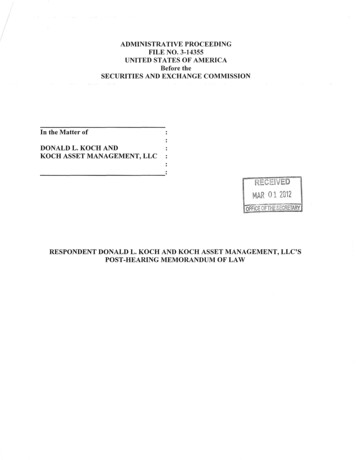
![OPTN Policies Effective as of April 28 2022 [9.9A]](/img/32/optn-policies.jpg)
